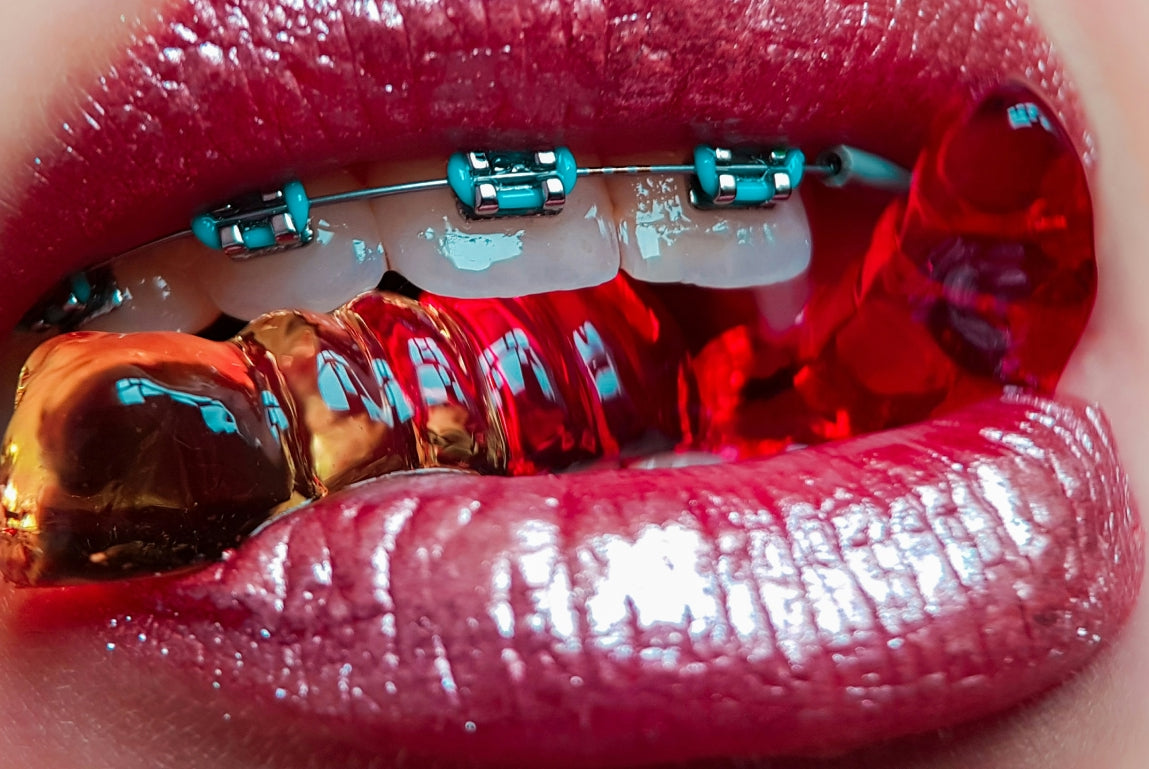

Key Takeaways
Artificial food dyes might mess with your hormones by acting as endocrine disruptors.
Artificial food dyes like Red 40 and Yellow 5 may trigger inflammation, which can impact sexual function.
Most dyed foods are processed and linked to poor metabolic and sexual health.
No definitive link exists between artificial food dyes and ED, but the risk pile-up is real.
A diet rich in whole, anti-inflammatory foods is your best bet for boosting sexual performance.
Taste the Rainbow, But At What Cost?
Those neon-colored candies and fluorescent sodas aren’t just an assault on your eyes—they might be giving your hormones a run for their money, too. From Red 40 to Yellow 5, artificial food dyes are in everything from sports drinks to breakfast cereals. And while they make food look more fun, the health trade-off might not be worth the Technicolor joyride—especially when it comes to your testosterone levels, libido, and overall bedroom performance.
So let’s break it down: Can food coloring really mess with your manhood? Or is it just another health panic without hard evidence?
WTF Are Food Dyes, Anyway?
Food dyes (or color additives) are ingredients added to food to make it look more appealing. They fall into two categories:
Synthetic/Artificial : These are the big-name troublemakers like Red 40, Yellow 5, and Blue 1. Made from petroleum, they show up in sodas, candies, processed snacks, and even some salad dressings.
Natural : These come from plant sources like turmeric, beetroot, and annatto. They may sound healthier, but don’t assume they’re always safer. Long-term effects haven’t been studied thoroughly for many of these either.
Regulators have cleared artificial food dyes for use—but concerns remain about their long-term impact. That’s especially true for men’s reproductive health, where questions around hormone disruption and metabolic effects are still swirling.
Red 40, Hormones, and Your Junk: What's the Deal?
There’s no smoking gun study that says Red 40 is causing erectile dysfunction. But we’re not exactly rolling in reassuring data either. What we do know is this:
1. Endocrine Disruption: Your Hormones on Junk Food
Some food additives are suspected endocrine disruptors—chemicals that can mimic or interfere with the body’s hormones. Hormonal imbalance symptoms (fatigue, mood swings, and yes, low libido in men) could be linked to these compounds.
Hormones like testosterone are key players in sex drive, fertility, and erectile function. If endocrine disruptors from artificial food dyes are messing with that delicate balance, it’s not a stretch to wonder if your libido might take a hit.
2. Inflammation and Sexual Function: An Unwanted Combo
Artificial food dyes like Red 40 and Yellow 5 can cause allergic reactions and low-grade inflammation in sensitive individuals. Chronic inflammation? Not sexy. It’s been tied to poor blood flow, lowered testosterone levels, and yes—erectile dysfunction causes.
3. Metabolic Health Mayhem
Most foods that are swimming in artificial food dyes are also sky-high in added sugars and fats. Think soda, donuts, and candy. Diets heavy in processed foods and testosterone don’t always get along. Conditions like obesity and metabolic syndrome are huge contributors to sexual dysfunction in men.
So while the artificial food dyes themselves might not be the only villain, they’re part of a larger dietary pattern that’s not doing your sexual health any favors.
What Does the Science Say?
Let’s be clear: we don’t have definitive studies linking artificial food dyes to erectile dysfunction or a plummeting sex drive. But here’s what we do have:
Research on behavioral effects in children (hello, hyperactivity).
Animal studies showing potential carcinogenicity .
Evidence of inflammation and allergic reactions in some people.
As for food dye health risks to your sexual health? The jury’s still out. But given the other health downsides of a diet heavy in dyed, ultra-processed foods, it’s worth reconsidering what’s on your plate.
Real Talk: What You Can Do About It
No need to live in fear of fluorescent frosting. But if you want to stack the odds in favor of your testosterone, sperm health, and stamina, here’s how to eat smarter:
1. Read the Fine Print
Check food labels for Red 40, Yellow 5, Blue 1, and other synthetic additives. They love to hide in unexpected places, like pickles and protein bars.
2. Pick Natural Food Color Alternatives
If you’re craving colorful food, try products that use natural colorants like beetroot, turmeric, or spirulina. Less synthetic stuff, more real food.
3. Go Full-Body Health Mode
An anti-inflammatory diet rich in leafy greens, berries, nuts, fatty fish, and whole grains can improve circulation and testosterone levels. Bonus: it helps tame systemic inflammation too.
4. Cut Down on Ultra-Processed Junk
Processed snacks are often swimming in additives and sugars. Dialing them back can support hormone balance, metabolic function, and sexual performance.
5. Hydrate, Move, Repeat
Water, cardio, and strength training boost blood flow and support hormone production—two major players in bedroom performance.
6. Listen to Your Body
If you feel off after eating dyed foods—headaches, fogginess, mood dips—it could be worth an elimination test. Pay attention and adjust.
When You Need an Extra Boost
Even with the cleanest diet, sometimes your body needs backup. That’s where Popstar Volume + Taste Supplement comes in. Designed to support semen volume and flavor with nutrients like zinc and L-citrulline, it’s like a love letter to your reproductive system—minus the glitter.
Wrap-Up: Protect Your Junk—Cut the Junk
Look, artificial food dyes aren’t the biggest enemy your penis has ever faced, but they’re definitely not helping. Whether they’re nudging your hormones off balance or simply tagging along with a bad dietary crowd, these colorful additives might be dragging your bedroom game down.
Cut back on artificial food dyes. Load up on whole foods. Keep moving. And if you need a little nutritional firepower to get your mojo back, Popstar Volume + Taste Supplement is here for you.
Your hormones—and your partner—will thank you.
FAQ: Artificial Food Dyes and Your Libido
Q: Can artificial food dyes cause erectile dysfunction?
A: There’s no slam-dunk study saying so, but they may contribute indirectly through inflammation or hormone disruption.
Q: Are natural dyes better for you?
A: Generally, yes. But even natural additives should be consumed in moderation. Real, whole foods are your safest bet.
Q: What are hormone imbalance symptoms in men?
A: Fatigue, weight gain, low libido, mood swings, and difficulty maintaining erections are all signs your hormones might be out of whack.
Q: Is there a connection between diet and erectile dysfunction?
A: Big time. Poor diet affects blood flow, metabolism, and hormone levels—all of which impact performance.
Q: Should I cut out all artificial food dyes?
A: You don’t need to go full monk mode. But reducing your intake of synthetic dyes—especially in processed foods—is a smart move.











